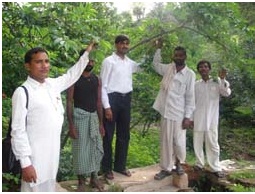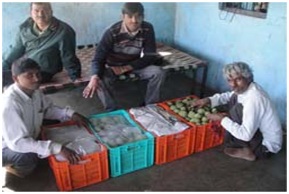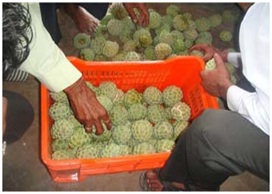Post Harvest Management of Custard Apple Enhanced livelihood of Tribals in Udaipur
Devla region of the Udaipur district is hilly, where tribal communities depend on forest produce for their livelihoods. The communities have been making a living by collecting and selling the minor forest produce including custard apple. It was observed that tribes collected custard apple fruits from the forests and marketed through middlemen. To help these communities to realize a better price, Vanwasi Forest and Agricultural Produce Cooperative Samiti, Devla was formed in 2009 and many Self Help Groups were also developed.
The production of fruits, on an average, was 20-25 truck loads in the entire region in one season. Due short shelf life, the fruits had to be sold fast thus fetching lower price. It was felt by the Samiti members that if proper post harvest management practices be introduced than the loss in the crop may be reduced and fruits can be sent to longer distances. The team of scientists of All Indian Coordinated Research Project of Applications of Plastics in Agriculture visited the area and consulted the officials of the Samiti to study the handling practices currently prevailing for the transportation of the custard apple and to suggest the appropriate handling mechanism for the custard apples.
Generally custard apples were picked up by the women and children and transported to the collection centre of the society. Tribes didn’t have knowledge about fruit maturity, plucking time, storage, grading, packaging etc. The normal practice of the tribes were to fill 20 kg of the fruits in plastic creates without any cushioning material and only the top surface was covered by the newspapers before transportation. It was found that 3-5 per cent loss in fruit mass takes place with this practice during 150 km transportation. They fill the crate in such a manner that after opening by the customer big, heavy and mature fruits can be seen at the top. Further, it was found that women and children were not aware of maturity level of the fruits and almost all collection centres have to waste a large quantity of immature fruits. Some of the centres have lots of waste custard apple (immature as high as 2-3 quintals).
A number of trainings of tribes of different collection centres were organized covering various aspects of post harvest management like harvesting, grading, packing, storage and record maintenance. The tribes were informed that custard apple fruits are considered to be mature and reach their harvesting point when the skin changes colour and when the segments spread far apart, exposing a creamy yellow skin. At this point they have reached their ‘consumption point’. They mature at irregular intervals over a period of 3 months, so that picking every other day or so is obligatory.
The sheets of packing material namely bubble sheet and foam sheets were given to the various collecting centre of selected tribes and packing techniques were shown to them in a training programme conducted at Devla centre of the Samiti. At five centres, fruit were packed by using four different packages such as wrapped in newspaper, packed in bubble sheet and foam sheet with control in which only top of the crate was covered by newspapers as practiced by the farmers. Twenty kg of the fruits were packed in the various packaging materials in plastic crates and transported at a distance of about 150 km.
It was found that the fruits packed in foam sheet have minimum loss in mass (0.67%) and hardness (3.02 %), while colour was same in all the treatments studied. The maximum loss in mass (2.95%) and hardness (7.88%) was obtained for the control sample. The colour of the fruits after transportation was found to be good may be due to ripening of the fruits in packing.
Foam sheet was found to be the best packaging materials for custard apple fruits during transportation for long distance to avoid loss in mass of the fruits, reduction in hardness of the fruits and variation in colour. With the reduction in the loss of custard apples, tribal region of Southern Rajasthan is capable of converting itself in to progressive region by adopting appropriate measures and adding few more other interventions as may be necessary.
With intervention of AICRP on APA, the custard apples fruits were harvested at proper maturity stage, packed in systematic manner with appropriate packaging material and marketed collectively at distant places like Udaipur, Sirohi, Pali, Jodhpur, Jaipur and even in nearby state Gujarat. Though Samiti was involved in the entire process initially, later on the group handled it confidently and replicated this experience in marketing other minor forest produce as well. The systematic interventions made on significant and sustainable impact on livelihood and income of tribal communities of the region.
(Source: AICRP on APA, MPUAT, Udaipur)


